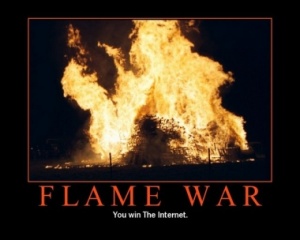Flaming
Flaming, also known as bashing, is Internet slang for when a user posts hateful comments in an attempt to degrade, anger, or discredit another user. The user who posts these comments is called a flamer. A popular viral video produced by College Humor called "We didn't start the flame war" puts a humorous spin on internet flaming. In addition flaming is different than Trolling although both are similar attacks in nature.
Contents
Types of Flaming
There are several types of flaming and activities regarding flaming.
Flame War
Flame war is a term used to describe a viscous fight back and forth between two different users in a comments section or blog post. Often times these spark when a user is trolling (see: Trolling) and an upstanding user or a moderator attempts to yell at that person or otherwise reprimand them for their inappropriate comments or posts. These types of interactions get out of hand very quickly, as one side of the argument is often times only posting to instigate the other users. The flame wars engulf entire comment threads and occasionally entire blogs, which is why most moderators immediately delete all posts from trollers and remove the privileges of those engaging in flame wars.
A way users attempt to prevent flaming from ruining the actual content of a blog or other medium users will chime in with comments along the lines of "don't feed the trolls" in reference to the popular belief that if you feed a stray or wild animal it will return to your house the next day to get more food. In that effect, the "don't feed the trolls" comment is a plea to the other users to ignore the comments of the trolls and they will eventually get bored and leave due to a lack of response to their provocations.
Flamebait
A term to describe when a user posts a message or comment on a controversial topic or subject in an attempt to fuel a flame war. This action is also known as Trolling. The user typically has no interest in the subject but is looking for attention and entertainment at the expense of other users.
Ethical Issues
Legality
Comments online can receive legal attention due to one of the characterstics of online verbal abusers, the legitimacy of threats against a person's life. The existence of legal repercussions against flaming or trolling are not guaranteed in every country. In the United States, for example, an internet service provider can choose to deny a paying customer service due to online abuse or the court system can be used to make Defamation, Libel and Slander claims. One of the reasons why online disputes do not reach legal status is due to the difficulty of tracking down the true identity of an online aggressor.
